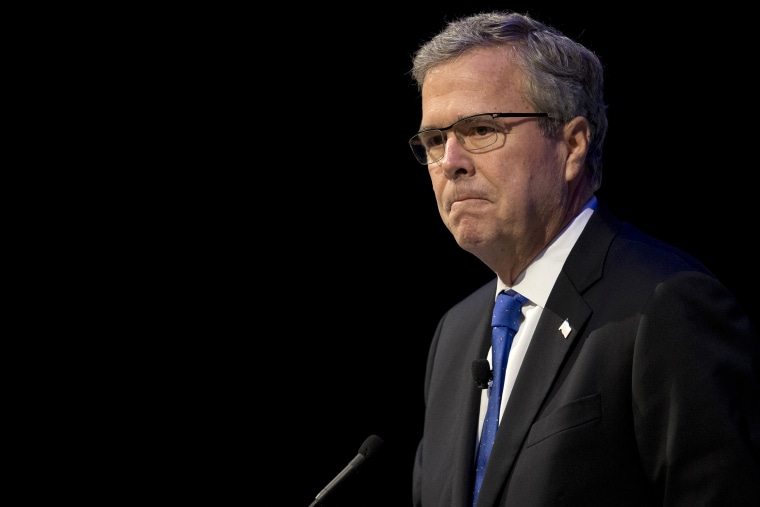For decades, the political debate surrounding the federal minimum wage has had fairly narrow parameters: the discussion was limited to those who wanted to increase the wage and those who wanted to keep it at current levels.
But as Republican politics moved to the right, a new contingent emerged: GOP lawmakers who believe federal minimum wage should be lowered from $7.25 to $0.
The far-right position is more common among congressional Republicans, but lately we've seen a growing number of GOP presidential hopefuls make the same argument -- former Texas Gov.
Rick Perry (R) and Sen.
Marco Rubio (R-Fla.), for example, have both said they're comfortable with eliminating the federal minimum wage altogether.
Yesterday in South Carolina, former Florida Gov. Jeb Bush (R)
appeared to endorse the same approach.
"We need to leave it to the private sector. I think state minimum wages are fine. The federal government shouldn't be doing this. This is one of those poll-driven deals. It polls well, I'm sure -- I haven't looked at the polling, but I'm sure on the surface without any conversation, without any digging into it people say, 'Yea, everybody's wages should be up.' And in the case of Wal-Mart they have raised wages because of supply and demand and that's good. "But the federal government doing this will make it harder and harder for the first rung of the ladder to be reached, particularly for young people, particularly for people that have less education."
The likely Republican candidate insisted a higher minimum wage would hurt workers at the bottom of the income scale. "Politically, I'm sure it's a great soundbite," Bush concluded. "But from an economic point of view this is not how we need to be successful."
Taken at face value, Jeb's comments weren't just expressing opposition to a minimum-wage increase, such as the one supported by President Obama, congressional Democrats, and most Americans. Rather, Bush seemed to be making an explicit case for eliminating the federal minimum wage altogether.
When The Hill asked Bush aides whether the former governor was making the case against a federal wage increase or against the existence of the federal minimum-wage law, the Republican's staffers
didn't want to talk about it. That said, Bush comments didn't leave much in the way of ambiguity.
As for the candidate's substantive argument against the minimum wage, it's worth emphasizing that there's
ample evidence that points in the exact opposite direction.
All of this comes against the backdrop of Sen. Patty Murray's (D-Wash.) new effort to gather support for the Democrats'
latest proposal for a minimum-wage increase.
Sen. Patty Murray (D-Wash.), ranking member of the Senate's labor committee, has been reaching out to her Democratic colleagues to rally support for a more ambitious minimum wage proposal, according to a Senate source familiar with the conversations. Murray's idea: hike the federal minimum wage to $12 by 2020, rather than the current $10.10 proposal languishing in Congress. The wage floor would then be tied to an inflation index so that it rose with the cost of living.
As the Huffington Post's report noted, Murray's proposal would increase the federal minimum wage from $7.25 an hour to $8 in 2016, "then a dollar each year thereafter until it hit $12 in 2020."
Congress' Republican majority will, of course, ignore the idea, but it's safe to say Dems will be eager to make this a key element of the 2016 elections.
*
Update: The AP
reported that Bush "said he doesn't want to abolish the existing federal minimum wage of $7.25 an hour, but also opposes raising it." His public comments suggested otherwise, and
The HIll's report
added, "Bush’s representatives did not return a request from The Hill to clarify whether Bush meant the federal government shouldn't be raising the wage or setting a minimum wage altogether."
